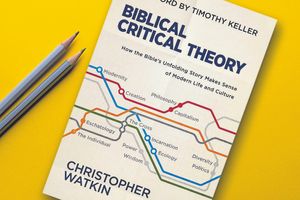Biblical Critical Theory by Christopher Watkin, Zondervan Academic, 2022, 648pp, ISBN: 9-780310128724
Christopher Watkin’s aim is to analyse and critique our contemporary culture through the lens of the Bible. He seeks to set out a Christian social and cultural theory based in theology and Scripture to help us understand and relate to the world in which we live. A laudable objective indeed, as shown in the sub-title, ‘How the Bible’s Unfolding Story Makes Sense of Modern Life and Culture’, and a welcome endeavour to deal with an important topic.
The book consists of 28 chapters set out over more than 600 pages and 114 figures or illustrations covering a wide range of theological themes and biblical overview. Dr Watkin, who is not a theologian, admits that he is not saying anything radically new. He takes an expansive overview of the subject matter and quotes from a range of diverse authors across various disciplines, although the choice does not always seem entirely relevant.
While the aim is admirable, it is not achieved. Rather, there is a good deal of fog and lack of clarity. The title is problematic and so too is much of the content. Perhaps most problematic of all is what is excluded.
Critical theory, which originated in the ‘Frankfurt School’ (a school of critical theory, philosophy, and social thought deriving mainly from the 1920s) is primarily an approach to action (praxis) rather than dogma or belief. The aim is to pursue certain outcomes – for example, equality or social justice. The late sociologist, Professor Christie Davies, always used to point out that the insertion of the word ‘social’ before a noun tended to reverse the actual meaning of the noun itself.
We see the impact of critical theory today in the current contemporary challenges around gender, racial issues, and approaches to history. We must overthrow the existing structures which prop up unjust systems of power or economics, rewrite partial and discriminatory histories, and so we end up with critical race theory, critical gender theory, and so on.
Critical theory or theories seek to overturn biblical norms for the family, for work and the economy, for justice, history, and gender, to name but a few. To equip us to respond, we need biblical clarity. But this book does not provide it.
Watkin develops an idea which he calls ‘diagonalization’ (is that even a word?). He argues (p.15): ‘Given a choice between two camps or positions in our culture, the Bible frequently settles for neither and presents us with something richer than both, a subtler solution that neither position has the resources to imagine.’
Consequently (p.17), ‘diagonalization presents a biblical picture in which the best aspirations of both options are fulfilled, but not in a way that the proponents of those options would see coming.’
Enjoying this article?
Why not try out Premium membership free for a month to read more great ET content (no payment details needed, cancel anytime).
Sign me up!Forgive me if I see this as simplistic, illustrative of the often superficial discussion of the actual issues Christians face today. Extreme dichotomies are presented. For example, immersion in the culture or separation from the culture? And diagonalization tells us we are ‘in but not of’. There are over a hundred such simplistic diagrams, which I found irritating rather than helpful.
Indeed, one consequence of all of this is little or no discussion of the actual cultural issues facing Christians. This derives from two structural weaknesses in the book.
First, there is a failure to properly discuss the creation mandates and the place of the moral law in society. One would expect to see both of these foundational points in any biblical social or cultural theory.
The first chapters of Genesis are authoritative and decisive for all humanity for all time. Yet the book lacks a proper discussion of the principle of a creation mandate. There is some helpful discussion around the Sabbath, but no attempt to place that into a context built on the creation principles.
One would expect something about creation mandates in general and then a discussion around particular examples and how we apply these today – dignity and life, work and wealth creation, marriage and gender, family, property rights, and so on. How is it even possible to discuss creation without discussing the creation mandate for marriage?
Perhaps it is this failure to consider creation mandates which explains the author’s intense criticism of the market economy which is spread throughout the book? The material on economics, markets, and taxation is shallow and insufficiently grounded in a proper understanding of God’s created order.
The so-called diagonalization on tax is between paying taxes and refusing to pay tax, a simply bizarre dichotomy. Perhaps there could have been a discussion as to why the Bible has no examples of progressive income taxes, only flat rates, but I suppose it would not fit the narrative.
Second, one would look for some discussion around the continuing place, or otherwise, of the moral law in society. We got emancipation and liberation theologies (old hat, I am afraid), but nothing on the manner or extent to which God’s moral law continues to apply to society. Does the moral law matter, or not? Does it matter today, or not? None of this was discussed in what was supposed to be a book on biblical engagement with culture.
Where is the debate around values, marriage, abortion, dignity, enterprise, work, crime, the nation state, the role of government, the voluntary principle? This type of discussion from a biblical perspective (and yes, wider than the traditional personal moral issues) would be genuinely beneficial.
One final point is that C. S. Lewis is often quoted; but he would be aghast at the content. Lewis viewed family, marriage, life, and liberty at the heart of what God has provided for us – the natural law, or the Tao as he referred to it sometimes. Biblical Christians see that reflected in the moral law of Scripture and its continued relevance for us today. Lewis was also concerned for economic and educational independence and highly resistant to an overpowerful state.
I am not convinced I am much the wiser after wading through over 600 pages. In reality I don’t expect many people will get that far. The book would be much improved at half the length.
Christians need help in engaging with the culture around us, clarity over the principles involved, the dangers faced, and the stands to take. We need high quality reflection on biblical and theological foundations, as well as the inspiration of examples from history. We need concise, coherent, and clear expositions and reflections to guide us. Perhaps try Sharon James’s The Lies we are Told, The Truth we must Hold?

By Dr Richard Turnbull, Director of the Centre for Enterprise, Markets and Ethics and Chairman of the Trustees of the Christian Institute.











